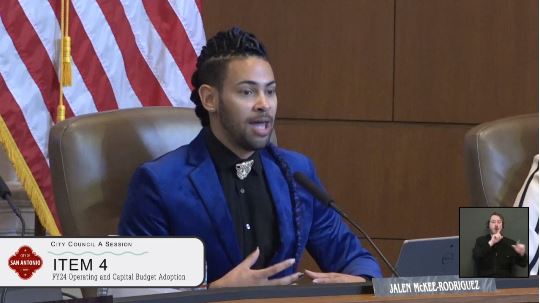‘Individual Gain’ Is Not Mutually Exclusive of ‘Collective Good’

It’s no wonder some in the establishment are scared of misinformation. It can be hard to kill off once the genie is out of the proverbial bottle. Add to this the notion that “individual gain and wealth” is mutually exclusive of what “provides the most public and collective good.”
It’s quite the contrary actually.
These were the words of District 2 Councilman Jalen McKee-Rodriguez just before they voted on the 2024 city budget. Unlike the government shutdown theatrics in Washington D.C., it was not a close vote here.
For the second consecutive year, it passed with all but one vote. Spending was hiked 9%; property taxes, 7%. One key word heard several times during the deliberations was “invest.”
Quite often elected representatives have an uninterrupted faith in their ability to do good with taxpayer dollars. They frequently refer to it as “public dollars,” perhaps in an effort to scrub from public view the forceful way in which those dollars were obtained.
They talk about “investing” in health, “investing” in education, “investing” in infrastructure, etc.
That word however, implies someone using their resources, or resources voluntarily entrusted to them, to return a profit from a successful good or service. If success isn’t realized, the resources, and perhaps jobs are lost.
Government operates with no such incentive, so there’s less motivation to be effective.
Look at the state of public education the last few decades. Pharmaceuticals are arguably promoted more than healthy living. And San Antonians for one, have a close-up view of the state of our roads the closer we get to downtown.
Not only does the aforementioned lack of incentives hamstring government from the very start, but the crony capitalism that runs rampant through the public sector detracts from genuine, organic wealth creation and collective good.
Taxing them in the worst, most complicated excessive ways inhibits this.
When we tax income, we discourage work. Does it necessarily dissuade us from working to support our families? No. But if it’s a net negative, why do policymakers promote it at all? If we’re being pickpocketed, do we wish the thieves to stop, or merely slow down?
The more we work, the more we can save and invest. These acts, by people who put in the effort, are what genuinely fuels prosperity. This real investment opens new, or expands existing businesses. It creates jobs, both on-site, at suppliers, retailers, wholesalers, etc.
When public bodies siphon some of this off via property, capital gains, dividend, estate taxes, the collective is less prosperous.
Instead, it gets rerouted through a bureaucracy that didn’t put in the sweat and the risk to earn it. Hence, the aforementioned lack of incentive to use it effectively, mush less efficiently. Special interests latch on in the hopes of becoming entrenched, leveraging political campaign contributions to these ends.
We trade of superior products and services brought to market voluntarily, for the exact opposite.
It doesn’t have to be this way.
When the tax burden is minimal, simple, and applied in the least-worst way (on consumption rather than working and saving), more flows int the government. This is not some hokey political theory used as a public punching bag, but reality backed-up by historical evidence.
Ease up on regulatory control, the positive effect is compounded. Politicians would be awash in tax revenue (this is not at all to condone their subsequent profligate spending, a topic for another essay).
If they possessed more humility, the true, few public goods that fall within government’s scope might stand a better chance. Citizens would be better served as they pursue their respective goals.
Misinformation has been plaguing us long before recent years. Wide swaths of the population have been led to believe FDR helped get us through the Great Depression, when in fact he doubled-down on Hoover’s bad ideas and made things worse.
More recently the mainstream media has promoted the narrative that the Great Recession was caused by unregulated capitalism. Tens of thousands of pages of regulations, trillions in spending and debt, and a distorted monetary regime say otherwise.
The sooner a machete is taken to the thicket of misinformation, the better off society will be.